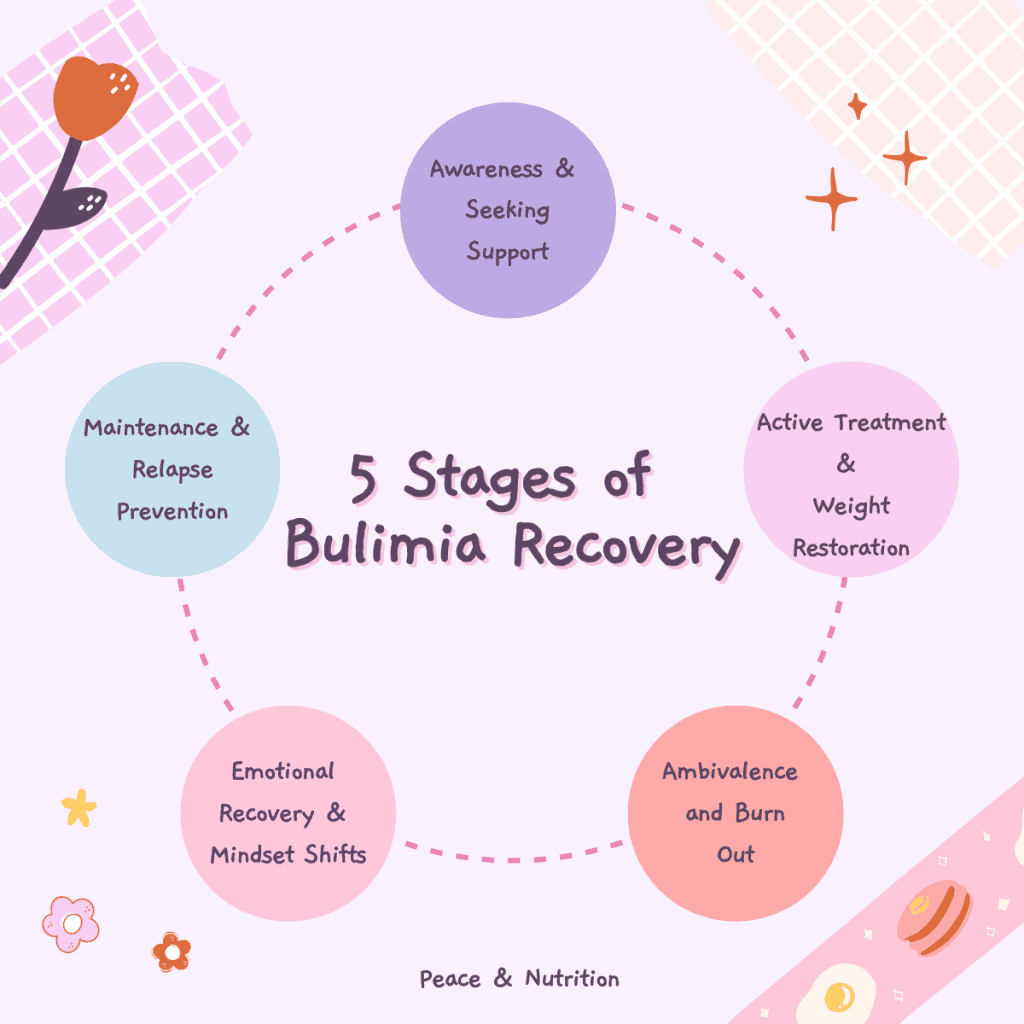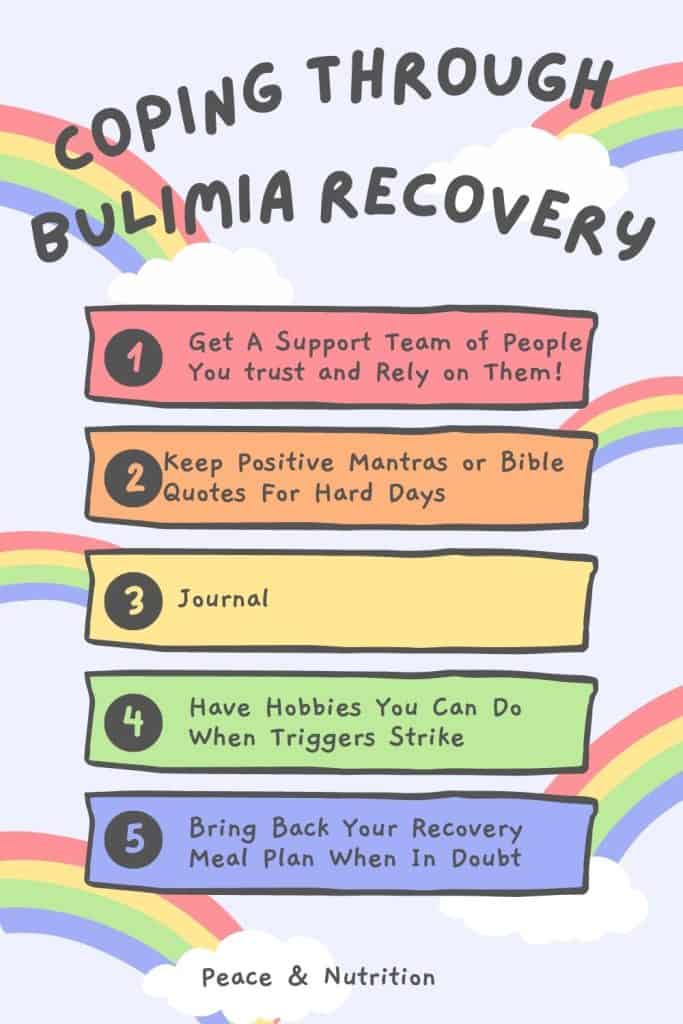Table of Contents
Recovery from bulimia is a journey, not a destination. Eating disorder recovery is often filled with progress, setbacks, and self awareness building. While eating disorder recovery is never linear, there are common stages of bulimia recovery that you can expect.
Stages of bulimia recovery include:
- Building awareness and a support team
- Treatment and weight restoration
- Ambivalence and burn out
- Emotional recovery
- Relapse prevention
You might feel like you are taking one step forward and two steps back in bulimia recovery. But this is all part of the process in eating disorder recovery.
This article explores each stage of bulimia recovery and tools to cope as you navigate through the very difficult stages of recovery.
Awareness and Seeking Support
Bulimia nervosa is a complex potentially life threatening mental health disorder distinguished by behaviors that can include food restriction, binge eating, and purging. This stage begins with you acknowledging that bulimia is impacting your health, relationships, and quality of life.
You might not be ready to seek help yet or admit just how sick you are, but you know something is wrong.
You’re ready to admit something is wrong because:
- You can’t stop thinking about food and how much you hate your body
- You’re purging
- You have a deep fear of gaining weight that causes extreme anxiety
- You avoid social activities where food might be present
- Your heart rate, blood pressure and lab values are abnormal
- You are starting to notice dental problems fro purging
- You’ve started losing your hair from malnutrition
- You’ve lost your period
While you might not feel like you’re ready for a full eating disorder recovery yet, you’re ready to tell someone about your eating disorder. You’re aware that your eating disorder has gotten out of control and it isn’t a problem you can solve on your own.

Active Treatment and Weight Restoration
In this stage you will begin actively addressing your eating disorder. This often includes therapy, medical monitoring, and nutritional counseling with an eating disorder dietitian. They may work on meal structure, reduce purging behaviors, and learn coping strategies to replace disordered habits. Emotional ups and downs are common.
Both in person and virtual eating disorder treatment options are often available but might vary depending on the level of care and medical monitoring you need during recovery.
This stage of recovery often involves:
- meal support
- An eating disorder meal plan.
- Weight restoration
- Symptom interruption (from behaviors like purging or laxative use)
- Discontinuing exercise
- Organ and tissue repair
- Sizing up in clothing and getting rid of your sick clothes
As regular eating patterns are restored, the body begins repairing damage. This can bring temporary side effects such as bloating, edema, digestive discomfort, or fatigue. While these changes can be unsettling, they’re signs of the body regaining balance. Patience and self-compassion are key.
Ambivalence and Burn out
This stage can happen prior to seeking out eating disorder recovery and after a full weight restoration has happened.
You may feel torn between wanting to stop/continue to not engage in eating disorder behaviors and fearing what a life without them will look like. You might feel exhausted with how long recovery is taking. You might feel like you’re failing at recovery because you’re still thinking about engaging in eating disorder behaviors often.
You probably think:
- You’ve gained too much weight during recovery and fear weight gain will never stop
- You feel like you’ve “recovered too far” or are “recovered enough”
- You feel like your eating disorder thoughts won’t stop
- You miss the control your eating disorder gave you
- You feel overwhelmed with emotions.
You might feel like giving up even after you have regained weight restored and resumed normal meals and snacks. This is a normal and even necessary part of the eating disorder process. It’s normal to grieve your eating disorder body and habits.

Emotional Recovery and Mindset Shifts
This stage may focus on body image work, self-esteem, and building a healthier relationship with food and exercise. Recovery involves addressing the underlying thoughts and beliefs that fueled the eating disorder.
It’s going to take a while for you to feel like you are emotionally okay after you recover physically from your eating disorder.
The mindset shifts in bulimia recovery can include:
- Learning to respect your body even if you don’t love it
- Journal body image thoughts and fears
- Stopping body checking
- Learning to manage emotions without the control of food restriction
- Building relationships
- Keep positive mantras or bible quotes for hard days available

Maintenance and Relapse Prevention
The maintenance and relapse prevention stage of bulimia recovery might be one of the most challenging stages of the recovery journey because it is the one that must be maintained lifelong. Recovery becomes about sustaining progress, staying connected to support, and recognizing early warning signs to prevent relapse.
Relapse prevention in bulimia recovery might include continuing to check in with your dietitian and therapist and using your meal plan if you start to notice food restriction. Maintenance and relapse prevention doesn’t mean that you are perfect in never engaging in any eating disorder behavior again. It instead means you rigorously seek out your tools and resources when you see eating disorder behaviors start to emerge again.

- 10 Tips To Cope With Bad Body Image Days - September 29, 2025
- Managing Bloating in Anorexia Recovery - September 15, 2025
- The Orthorexia Quiz: Created by A Dietitian - August 25, 2025